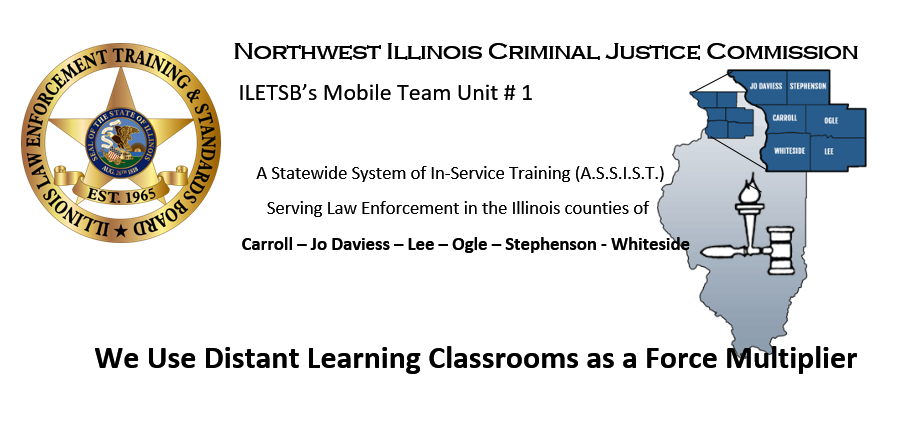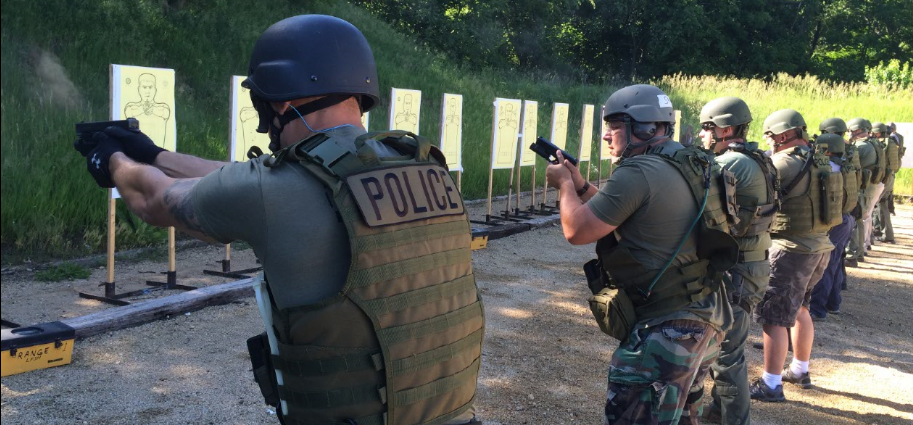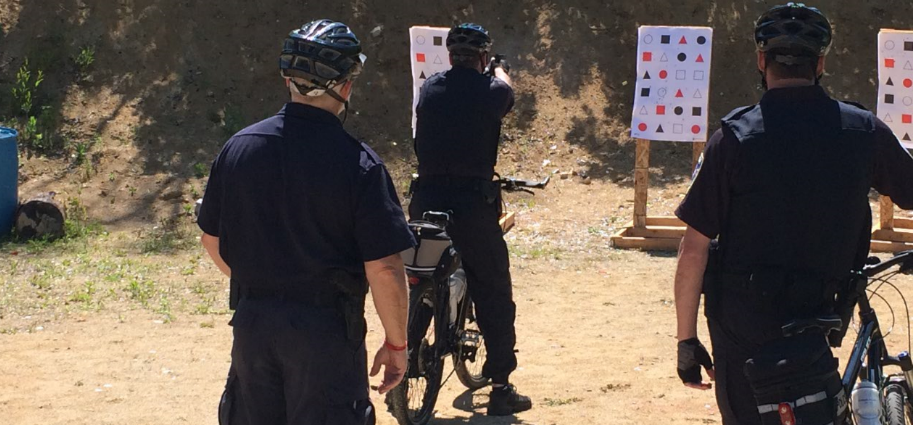36 hr. New Detective & Basic Criminal Investigator-Normal
Registration Deadline: Monday, September 16, 2019
Time: 8:00 AM - 5:00 PM
Heartland Community College - Room NRC 1202
Normal, IL
Members' Fee: $0
Sworn Non-Members' Fee: $0
Non-Members' Fee: $495
DOWNLOAD FILE
Class dates: October 14-18, 2019 - 36 hours
TIME: 8:00am-5:00pm on 10/14-17 & 8a-12p on 10/18 36 total hours
This is a co-sponsored class between MTU8 - 5 seats available for MTU1
There are special registration instructions found below and on the flyer
If you do not also register on the PATC site, you may arrive at class and not have a seat.
COURSE CONTENT: This course is composed to assist the newly appointed detective, or patrol officer conducting investigations, in becoming familiar with the many aspects of a criminal investigation. It is designed to assist in providing a solid foundation of basic techniques from which detectives can build upon as they progress through their careers. Policies and procedures differ from agency to agency and this presentation is a general overview, not to conflict with your department operating guidelines in criminal investigations.
BEGINNING THE CRIMINAL INVESTIGATION
The 10 most common investigative errors - Defining crime – Evidence and crime scene issues – Investigative training skills required – The investigator’s responsibilities – The preliminary inquiry
THE CRIME SCENE
Fourth Amendment considerations – Judicially created exceptions – Search warrant requirements – Crime scene search & protection of area – Thermal injuries- Blood at the scene – Dental - 3 types of track evidence- The importance of documenting weather- Blood at crime scenes- Hangings vs. Strangulations – Searches - Shaken Baby Syndrome
INJURY & DEATH INVESTIGATION
Overview – Motives for murder – Classifications of homicide – Evaluation of information from the autopsy – Time of death considerations – Wound information and evidence – Firearms – Blunt force trauma – Incisions – Stabbing – Offender injuries from self-wounding – Suicide investigations – Autoerotic asphyxia & “The Choking Game”
SEX CRIMES
The basic principles of deviant sexual behavior – Paraphilias – Investigative strategies for officers to include - The 4 types of rapists - The 3 defenses a rapist will give you - The two “M.O.’s in a sex crime - The two parts of a confession with sex offenders - The three reasons “evidence” is taken from a rape scene
CONDUCTING THE CRIMINAL INVESTIGATION
Where Your Investigation Begins – Legal Issues Involving the Investigation – Goals and Objectives of a Successful Investigation – The Importance of the Post-Arrest Investigation – Case Management Strategies – Organization – Checklists - Solvability Factors / Case Filtering – Studies Impacting Criminal Investigations – Sources of Information – Knowing & Utilizing Available Resources – Analytical Tools and the Internet – UCR/NIBRS
DIGITAL EVIDENCE
Importance of digital evidence – Types of digital evidence – Legal issues, judicial decisions – 4th Amendment issues – The search warrant – Methods of collecting digital evidence – Proper examination of digital evidence
IDENTITY CRIMES
Personal identifiers – Financial identifiers – Methods of obtaining personal information – Best practices for reducing identity crime – Federal Trade Commission and Secret Service roles in ID crimes
CONDUCTING SUCCESSFUL INTERVIEWS
Introduction to interviewing – Witness reliability issues – Witness types – Best practices for conducting successful interviews
CONDUCTING SUCCESSFUL SUSPECT INTERROGATIONS
Goals of the interrogation – Legal guidelines – 5th & 6th Amendment considerations – U. S. Supreme Court decisions – Planning and documenting the interrogation – Types of suspect interviews and methods of obtaining information
INVESTIGATING CRIMES AGAINST THE ELDERLY
Recognizing the signs & symptoms of abuse – The various types of abuse – Cons, scams, and tricks – Identity crimes – Investigative techniques & resources – Confidence games – 7 deadly scams – Victim and offender profile – Financial abuse checklist – Methods of obtaining a successful interview with the elderly victim or witness - Building an evidence based prosecution: build a stronger case – Recognize unusual evidence – Make the most out of your crime scene
CASE STUDY: Florida serial homicides; America’s first female predatory serial killer
THIS IS NOT A PUBLIC MEETING
REGISTRATION:
All registrations must be done according to these directions in order to have your tuition covered by MTU1.
1. Register on the MTU1 website to reserve your tuition reimbursement
If the mtu1 website shows a waiting list- MTU1 may not cover your tuition, unless there is a cancelation
2. Then register on the PATC registration page for this class. When choosing method of payment select “invoice agency” and forward the invoice to MTU1 at doug@mtu1.com. MTU1 must have the invoice prior to the class start.
If you do not also register on the PATC site, you may arrive at class and not have a seat.
MTU1 is only covering the tuition costs for member agencies, IF the members also register on the MTU1 website. This is a nationally advertised course. You may register with PATC independent of MTU1, but your agency must cover tuition costs.
INSTRUCTORS
THOMAS G. TITTLE is a retired Captain with the Marion County, Florida, Sheriff’s Office. Captain Tittle became a member of the Marion County Sheriff’s Office in 1977 and was assigned to the Civil Division. Since then he has held assignments within the following areas: Patrol Division, Street Crimes, Property Crimes, Major Crimes, Training Director, Community Relations, D.A.R.E. Officer, Drug Unit and Communications.
Prior to the Juvenile Division, Captain Tittle was in charge of a District Station where he supervised uniformed patrol officers and a district detective. Additionally, he was on the S.W.A.T. for 13 years with his last assignment as a Team Leader.
During Captain Tittle’s tenure in investigations, he has investigated numerous major crimes, drug cases and property crimes, including, but not limited to: sexual assaults (children and adults), child abuse, robberies, suicides, death investigations, crimes against persons, and vice cases. Captain Tittle holds an Associate of Arts degree from Central Florida Community College in Ocala, Florida.
He also holds a Bachelor of Arts degree from the University of West Florida in Pensacola, Florida. Additionally, he is a graduate of the Southern Police Institute in Louisville, Kentucky. He has attended numerous courses in Death Investigations, Sex Crimes, DEA School, Sniper school, SWAT courses and Domestic Relations.
Captain Tittle is an adjunct instructor at the Central Florida Community’s Criminal Justice Institute where he has instructed firearms, driving, domestic violence, crisis intervention and interviews & interrogations techniques and crimes against the elderly.
Captain Tittle has had articles published in; The Florida Police Chief, American Police Beat and Inside School Safety and has self-published six law enforcement training manuals.
BRIAN J. JARVIS is a police professional with thirty years of experience in law enforcement and investigations, retiring in 2008 at the rank of Chief of Police. Prior to being appointed as the Chief of Police for the Town of Chester in 1998, he served ten years working for Municipalities in Orange County, New York, and ten years in the State of Florida, where he was employed as an Investigative Sergeant in charge of Major Crime Investigations.
Chief Jarvis was responsible for the investigation and supervision of Major Crime Scenes which include, homicides, sexual assaults, kidnappings, armed robberies, bank robberies, home invasions, carjackings, aircraft crashes, train / pedestrian fatalities, suicides, child abuse and neglect, and officer involved shootings involving death.
Chief Jarvis holds a Bachelor of Science Degree in Information Systems from the University of Phoenix. He also attended the Associates of Arts program in Criminal Justice at Central Florida Community College from 1987 – 1991. He has also attended several courses on Major Crime Investigations, including Practical Homicide Investigation and Sex Crime Investigations offered by the University of North Florida, and Basic and Advanced Computer Crime Investigations offered by the Florida Department of Law Enforcement Organized Crime Institute.
In addition to serving as Chief of Police, Chief Jarvis has also been a member of the International Association of Chiefs of Police (IACP), New York State Police Juvenile Officer’s Association, NYS Association of Chiefs’ of Police, Past President of the Police Chiefs’ Association of Orange County, and a founding member of the Orange County Law Enforcement Training Institute. He is also an active member in the International Law Enforcement Educators and Trainers Association (ILEETA).
Chief Jarvis is a published author, having written a story for “American Blue”, Varro Press Publishing, Ed Nowicki Editor (All proceeds benefit the National Law Enforcement Museum in Washington D.C.). He has also published several law enforcement-training manuals. Brian is a pilot and serves as a volunteer for Angel Flight Southeast.
Request for certification of this course has been approved by ILETSB for approval in meeting mandatory training for:
☒ Law Updates
☐ Use of Force (must include scenario based or similar approved
☒ Civil Rights
☒ Constitutional and proper use of law enforcement authority
☐ Cultural competency
☐ Procedural Justice
☒ Human Rights
☐ Trauma Informed Response & Investigation of Sexual Assault & Abuse
☐ Mental Health Awareness
☒ Lead Homicide Investigator training









